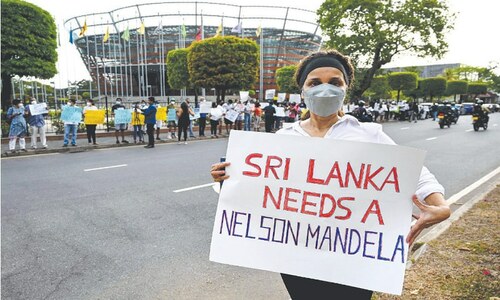COLOMBO: Armed troops in Sri Lanka had a tense confrontation with a crowd protesting a worsening economic crisis on Sunday, after a social media blackout failed to halt another day of anti-government demonstrations.
The South Asian nation is facing severe shortages of food, fuel and other essentials — along with record inflation and crippling power cuts — in its most painful downturn since independence from Britain in 1948.
President Gotabaya Rajapaksa imposed a state of emergency on Friday, the day after a crowd attempted to storm his home in the capital Colombo, and a nationwide curfew is in effect until Monday morning.
The Samagi Jana Balawegaya (SJB), Sri Lanka’s main opposition alliance, denounced a social media blackout aimed at quelling intensifying public demonstrations, and said it was time for the government to resign.
Internet service providers were ordered to block access to Facebook, WhatsApp and Twitter
“President Rajapaksa better realise that the tide has already turned on his autocratic rule,” SJB lawmaker Harsha de Silva told AFP.
Troops armed with automatic assault rifles moved to stop a protest by opposition lawmakers and hundreds of their supporters attempting to march to the capital’s Independence Square.
The road was barricaded a few hundred metres from the home of opposition leader Sajith Premadasa and the crowd engaged in a tense stand-off with security forces for nearly two hours before dispersing peacefully. Eran Wickramaratne, another SLB lawmaker, condemned the state of emergency declaration and the presence of troops on city streets.
“We can’t allow a military takeover,” he said. “They should know we are still a democracy.”
Social media blackout
Internet service providers were ordered to block access to Facebook, WhatsApp, Twitter and several other social media platforms but the blackout did not deter several small demonstrations elsewhere in Sri Lanka.
Police fired tear gas to disperse university students in the central town of Peradeniya, though protests in other parts of the country ended without incident.
Private media outlets reported that the chief of Sri Lanka’s internet regulator resigned after the ban order went into effect. The blackout was rescinded later in the day after the country’s Human Rights Commission ruled that the defence ministry had no power to impose the censorship.
The streets of Colombo stayed largely empty on Sunday, apart from the opposition protest and long lines of vehicles queued for fuel.
But police told AFP that one man had died by electrocution after climbing a high-tension pylon near Rajapaksa’s home. Residents said he was protesting rolling power cuts.
Mass protests had been planned for Sunday before the social media blackout went into effect, but organisers have postponed the rallies until after the curfew is lifted on Monday.
Internal rifts
The escalating protests have led to fissures within the government, with the president’s nephew Namal Rajapaksa condemning the partial internet blackout.
“I will never condone the blocking of social media,” said Namal, the country’s sports minister.
A junior party has also hinted it may leave the ruling coalition within a week.
Published in Dawn, April 4th, 2022














































